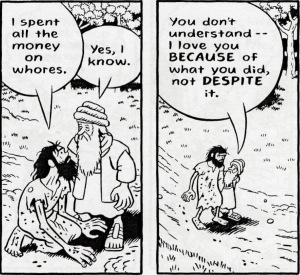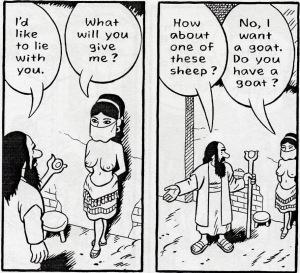Chester Brown is one of the most renowned and respected cartoonists in the world; he and I first met online about four years ago and quickly became friends. And while I did give him a little help with his revised edition of Paying For It, and he drew the cover for my book Ladies of the Night, his new book is the first one I’ve been privileged to see developed from the very first kernel of the idea (shared in a letter to me several years ago) all the way to distribution and book signings. So once the initial release whirlwind had died down and I figured he might have some time, I asked him if he’d like to do a guest column introducing the book; he sent this the very next day. Oh, and one more thing: Chester now has a Patreon account, and if supporting outspoken allies of sex workers is important to you, you really should consider signing up to that. Just sayin’.
While the subtitle of my new book is Prostitution And Religious Obedience In The Bible, and there are stories about several biblical prostitutes in it, Mary Wept Over The Feet Of Jesus is mostly about the connections that Jesus had to prostitution. I’m proposing three interrelated ideas:
- Mary, the mother of Jesus, was a prostitute.
- Mary of Bethany, the woman who anointed Jesus as a christ, was a prostitute.
- Jesus’s parables about The Prodigal Son and The Talents indicate that he didn’t see prostitutes and their clients as sinners to be forgiven but, rather, saw paying for sex as socially beneficial.
 I’m not going to try to convince you that I’m right about all that here; that’s what the book is for. Instead I want to talk about the issue of bias. Some critics have dismissed my ideas because I have a bias; for example, see this piece in the A.V. Club. It is true that I have a bias; I’ve been a client of sex workers for seventeen years and do happen to see the profession as socially beneficial. I’ve made no attempt to hide that fact. The question is, does having a bias on a particular subject necessarily invalidate one’s views on that subject? Should Martin Luther King Jr’s views on civil rights have been dismissed because, being a black man, he had a bias? I think it’s precisely because I have a bias that I was able to see certain things in the Bible that haven’t been obvious to others. And it’s not like others who’ve written about Jesus and prostitution before me did not have a bias on the subject of sex work; in fact, I’d venture to guess that the vast majority of biblical scholars, past and present, had and have a whorephobic bias against sex work.
I’m not going to try to convince you that I’m right about all that here; that’s what the book is for. Instead I want to talk about the issue of bias. Some critics have dismissed my ideas because I have a bias; for example, see this piece in the A.V. Club. It is true that I have a bias; I’ve been a client of sex workers for seventeen years and do happen to see the profession as socially beneficial. I’ve made no attempt to hide that fact. The question is, does having a bias on a particular subject necessarily invalidate one’s views on that subject? Should Martin Luther King Jr’s views on civil rights have been dismissed because, being a black man, he had a bias? I think it’s precisely because I have a bias that I was able to see certain things in the Bible that haven’t been obvious to others. And it’s not like others who’ve written about Jesus and prostitution before me did not have a bias on the subject of sex work; in fact, I’d venture to guess that the vast majority of biblical scholars, past and present, had and have a whorephobic bias against sex work.
Let’s talk about two relatively recent examples that I came across while researching for my book. Karen King is a biblical scholar whom I have a lot of respect for. Her fascinating book What Is Gnosticism? transformed my understanding of that subject. In 2003, she published a book titled The Gospel of Mary Of Magdala. In it, King translates and analyzes an ancient text known as The Gospel Of Mary, which presents a woman named Mary as Jesus’s wisest disciple. Most people assume that the woman is Mary Magdalene, and they’re probably right; I would recommend King’s book to anyone who wants to understand this difficult text. On page 3, King writes that The Gospel Of Mary “exposes the erroneous view that Mary of Magdala was a prostitute for what it is — a piece of theological fiction”. However, reading the text of the gospel, one finds no mention of prostitution; there’s no indication what Mary’s source of income was. (Even a spiritual person in first century Palestine needed some sort of income, whether it was from begging or some other source.) There’s no sign one way or the other in The Gospel Of Mary, as we have it, that Mary was or wasn’t a prostitute, nor is there any mention of sex; furthermore, King doesn’t interpret any of the material as relating to prostitution or sex. Now, since there are many pages missing in the two surviving manuscripts of the text, it’s possible that one of those missing pages mentioned that Mary was a prostitute. (I hesitate to get conspiratorial, but perhaps it wasn’t a coincidence that certain pages went missing in both surviving manuscripts.) But even if those missing pages didn’t mention that Mary was a prostitute, that still wouldn’t prove she wasn’t one. So why does King think that the The Gospel Of Mary PROVES that Mary never had sex for pay? King doesn’t explain her reasoning, but there can be only one reason: The gospel presents Mary as the most wise and spiritual of the disciples of Jesus, and King whorephobically assumes that a prostitute could not be wise and spiritual.
In the 2006 book Secrets Of Mary Magdalene, edited by Dan Burstein and Arne de Keijzer, there’s an essay by the respected historian James Carroll in which, on page 24, he quotes Luke 8:2-3. In that biblical passage, it’s mentioned that Mary Magdalene and several other women “provided for them [Jesus and the male disciples] out of their own resources.” Carroll reads this as an indication that Mary and the other women must therefore have been “well-to-do, respectable figures.” In other words, they could not have been prostitutes, because, of course, only well-to-do, respectable women had money — prostitutes had absolutely no way to get ahold of money. This isn’t quite as obviously whorephobic as the Karen King example, but it does indicate a desperate over-eagerness to distance Mary Magdalene from prostitution. Why wasn’t it obvious to Carroll that, while evidence that Mary Magdalene had money could indicate that she was “respectable”, it could just as easily be evidence that she was a prostitute? There’s a probably unconscious bias going on there, and one sees it over and over while reading books about biblical prostitutes in general and Mary Magdalene in particular.
 On the question of whether Mary Magdalene was a prostitute, I don’t have a definite opinion one way or the other. It’s true that none of the biblical books link Mary Magdalene with the profession, but Jesus was close with Mary of Bethany, who definitely was a prostitute, and it could be that Mary Magdalene and Mary of Bethany were the same person. It’s also possible that they were two separate women, since the name Mary was popular at the time. (See pages 245 to 253 of Mary Wept for more on this.) A basic rule: when a scholar claims with certainty that Mary Magdalene absolutely could not have been a prostitute, that scholar probably has a bias against sex work. That doesn’t mean that all of that scholar’s conclusions should be dismissed, any more than my pro-sex work bias means that my conclusions should be dismissed. All it really means is that readers should keep authorial bias in mind when reading any book.
On the question of whether Mary Magdalene was a prostitute, I don’t have a definite opinion one way or the other. It’s true that none of the biblical books link Mary Magdalene with the profession, but Jesus was close with Mary of Bethany, who definitely was a prostitute, and it could be that Mary Magdalene and Mary of Bethany were the same person. It’s also possible that they were two separate women, since the name Mary was popular at the time. (See pages 245 to 253 of Mary Wept for more on this.) A basic rule: when a scholar claims with certainty that Mary Magdalene absolutely could not have been a prostitute, that scholar probably has a bias against sex work. That doesn’t mean that all of that scholar’s conclusions should be dismissed, any more than my pro-sex work bias means that my conclusions should be dismissed. All it really means is that readers should keep authorial bias in mind when reading any book.
